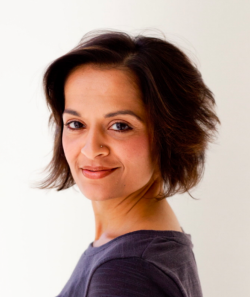The progress in medical technology, hygiene, and pharmaceutics hasn’t stemmed chronic illness–which takes up an astonishing 75% of our healthcare spending. Body pains and aches, migraines, GI issues and irritable bowel syndrome, racing heart…If tackling these conditions just using traditional medicine doesn’t work, what can help? Dr. Aditi Nerurkar M.D., a Harvard-trained physician and named “Top Breakthrough in Integrative Medicine” by the Huffington Post and profiled on the Wall Street Journal, CNN, NPR, and others, proposes integrative medicine, the mind-body connection, and stress management. As an integrative physician, Dr. Nerurkar prescribes not only medication, but also un-traditional therapies such as meditation, yoga, and tai chi for her patients at Beth Israel Deaconess Medical Center in Boston.
PD: How did you become interested in studying integrative medicine?
AN: When I was in medical school, I never even knew that such a thing existed. I think my interest in integrative therapies came from being a resident; it was a very stressful time being on call, working 80 hours a week. I used it to help with my own stress and sleeping problems. When you’re on call, it’s difficult to fall into a regular sleeping rhythm. So I started practicing meditation and yoga. I lived in Philadelphia at the time as a resident and there was a great yoga studio nearby and I sort of fell into meditation. So my interest in integrative medicine was a personal one. When I noticed that it worked well on me, I started thinking, “Hey, maybe there’s something to this.”
PD: How do you define the term “integrative medicine”?
AN: Integrative medicine, the way I define it, is a complementary therapy. I don’t use the word “alternative.” I actually say that it’s an “unconventional” therapy that is evidence-based, so always backed by science, and used as an adjunct in conventional medical care. It’s used as part of the larger medical picture and it’s part of the treatment plan as devised by a physician.
PD: What did you research as an Integrative Medicine Fellow at Harvard Medical School?
AN: For my first study, I discovered this survey called the NHIS, the National Health Interview Survey, that asks patients in the U.S. various questions. What we found was that nearly 6.4 million Americans were recommended mind-body therapies like yoga, meditation, relaxation training, tai chi, etc. No one had ever looked at whether mind-body therapies were really coming into the mainstream model and our study showed not only that they were, but in such high numbers. As I stayed in my fellowship, I realized that for me what was interesting was stress. All of these therapies help mitigate the flight-or-flight response. We know that 60-80% of office visits have stress-related components to them—this is prior research. My second study looked at how many times in those visits a doctor actually manages someone’s stress. We found that even though 60-80% of office visits in primary care have some component of stress, only 3% of office visits had stress management counseling. And that was a huge need. We postulated in that paper various reasons for this: because many primary care doctors don’t have time; they’re too burdened with other things.
PD: What does the stress management counseling that you offer your patients entail?
AN: There are two kinds of stress: acute stress and chronic stress. Recently there was a paper showing that people who have gone through the acute stage of grief had a 20-fold increase in their risk of heart attack. That’s acute stress. Chronic stress is more pervasive and low-grade. It’s what most people suffer from right now. So my work is mostly on chronic stress. Chronic stress has been associated with all sorts of chronic and acute medical conditions: something as simple as the common cold, elevated blood pressure, heart attack, increased sensations of pain, migraines, joint pain, irritable bowel syndrome, and various G.I. issues.
We all have our own threshold for stress. Something that is stressful for one person might not be stressful for someone else and that is not right or wrong, good or bad; that’s just the way it is. A little bit of stress is actually very good. It keeps up healthy. It keeps us productive. It keeps us motivated. It keeps us engaged with life. There are good elements of stress, but once it goes past a certain threshold, that’s when it starts becoming problematic: when it starts affecting your sleep, your mood, your relationship with others, your sense of motivations. The patients that come to see me have already identified themselves or they’ve had a physician identify that stress is getting in the way of their everyday life and that maybe they need professional intervention. That’s where I come in. I have patients that come to see me because they want to do this as a preventative measure and who want to know, “What can you teach me and what can I do to really get my stress under control?”
Stress is a huge problem. It’s the elephant in the room. No one talks about it because we don’t really have in the conventional medical system ways to help manage stress. So if a patient says, “Yes, I’m really stressed,” we refer them to a psychologist. There are things that we can do, but for me, I think that mind-body therapies—meditation, yoga, tai chi—these are things that could be really helpful.
PD: What advice do you have for individuals considering adding mind-body therapies to their healthcare regimen?
AN: The first step is to talk to their doctor. Maybe their doctor already has links to certain providers. The second thing is for patients to read more about mind-body medicine and other integrative therapies for their own conditions. The National Center for Complementary and Alternative Medicine (NCCAM) website is an excellent resource and I recommend it to all of my patients. It offers up-to-date information on the research behind integrative therapies. If a patient is interested in a particular medical center’s academic program, like Beth Israel Deaconess Medical Center, for example, they can go to their website and read about each provider. For most integrative medicine centers, like us, we have really tried to make it as patient-directed as possible. We’re in an age of what we call patient-centered medicine. Integrative medicine is all about being patient-centered; we look at the person as a whole. It’s not just about disease. It’s about the whole person, and not just the person, but how they interact with their family, community, and job. There are so many ways patients can start integrating mind-body therapies into their conventional medical care. Of course, though, you have to talk to your doctor and get their stamp of approval.
PD: What do you think the future of integrative medicine is?
AN: Just in my time alone of starting a fellowship five years ago, there have been huge strides in integrative medicine. We built our integrative medicine center in the hospital just three years ago. I can’t imagine doing anything else in medicine. We’re all learning, all of us including the hospital administrators, conventional doctors, and integrative doctors. There’s so much newness everywhere and there’s a real beauty in that. People are really collaborating because they know that the old medical model is not working. Everyone’s trying their best to address the gaps. I think that integrative medicine has a huge future and so much promise.
Related: What You Should Know About Seeing a Naturopath
The Zen Diet: How Meditation Helped Me Lose Weight
5 Best Tips for Immediate Stress Relief
Also by Angelica: ChiRunning for Mind, Body, and Spirit
__
Photo: www.aditinerurkar.com; RelaxingMusic via Flickr






